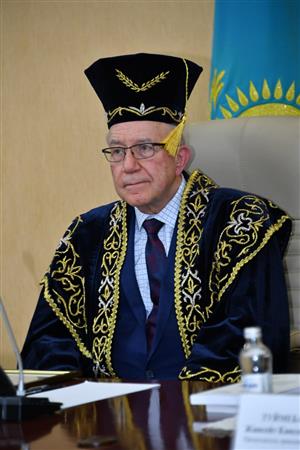- Main page
- News
DAN DAVIDSON, PRESIDENT OF ACCELS: IT IS IMPORTANT TO SEE THE "BIG PICTURE"
5/4/2022
KazNU hosted a leadership lecture by Dr. Dan Davidson, President of the American Councils for International Education (ACCELS). At a meeting with the learning youth and faculty of Al-Farabi Kazakh National University, he spoke about the implementation of the Flagship program and shared a wealth of experience.
At the beginning of the meeting the Chairman of the Board - Rector of Al-Farabi Kazakh National University introduced the professor Bryn Mar Davidson to the audience and enumerated numerous regalia of the scientist, who is a full foreign member of the Russian Academy of Education (RAO), National Academy of Pedagogical Sciences of Ukraine, Honorary Doctor of Russian Academy of Sciences (RAS), Knight of the Order of Friendship of Peoples of the USSR (1990) and others.
The head of the university stressed in his speech: "The authority of the scientist and educational organizer Dr. D. Davidson is high and recognized. Knowing Mr. Davidson personally, I want to especially thank him for his reverent attitude to Kazakhstan and to our university. We have big plans for the future. Students from America will come to KazNU to study Russian and Kazakh languages, on training - teachers of colleges and teachers of schools in the USA. We need to be well prepared for their meeting, to interact, communicate and learn new things.
The head of the university solemnly presented Mr. Davidson with a diploma on the title of Honorary Professor at Al-Farabi Kazakh National University.
In turn, the scientist has expressed huge gratitude to the rector of the university and personally to professor Eleonora Suleimenova "for an intellectual inspiration, the long-term cooperation, created conditions for American students and support of all initiatives, fine harmonious work on the program "Flagship" of teachers of faculty of philology of university". "And, of course, I sincerely hope that our excellent partnership relations will develop further and I wish your team great success", - said the guest of honor.
Dr. Davidson then brought to the meeting's attention the results of the Flagship program, highlighting the role of mobility of schoolchildren, students, academics, and ideas. "There is broad consensus that knowledge is produced and transmitted most effectively by research universities, and that the best ones are not just national, but global," the speaker said. - And the excellent example of Al-Farabi Kazakh National University is illustrative in this regard."
In preparation for the new generation of the demanded specialists the following competencies are important: interpersonal skills, including negotiating; strategic perspective or ability to see "the big picture", creativity and ability to recognize patterns, to find new alternatives and effective solutions of problems; deep understanding of the world and indigenous communities (communities), their history and system of values underlying them; conscious learning and ability to adapt to the new environment, integrate knowledge from different sources and continue to International students undergo a process of ongoing socialization in the host culture. They learn to interact with people of different emotional, cognitive and behavioral orientations to the world while maintaining their own identities. Language proficiency is a major factor in students' cultural and intercultural growth: the higher the level of language proficiency, the more subtle and comprehensive the potential for the development of cultural skills.
Thus, the mission of the American Councils (AC) is to provide access to foreign higher education institutions and schools, for international education. As of 2022, 95,000 graduates from 90 countries have graduated from the AU program, 5,000 scholarships per year have been awarded, hundreds of conferences are organized, textbooks are published, publications are produced, studies, tests, fairs, etc. Every participant in the Flagship Programme has previously studied in the country of his or her native language and is learning not only Russian but also the national and Kazakh languages. The percentage of students who reach the professional level-3 in the KazNU program is 93 percent, with the majority continuing on to postgraduate studies or faculties. Many find the opportunity to return to Kazakhstan. The Flagship Programme draws on experimental and academic concepts: experimental learning theory (Kolba 1984) and transformational learning theory (Vygotskij, Mezirow (2000) et al.
Dr. Davidson spoke at length about the work of the Flagship program, which over the past 1.5 years has been delivered remotely due to the pandemic. As such, participants faced some language and cultural immersion challenges but overcame these to successfully complete the training. Thus, "Flagship", a well-developed program implemented at KazNU, is capable of: training highly functional bilinguals, people capable of conveying meaning with a high degree of accuracy, building and maintaining professional relationships with locals, and succeeding as a global professional in their chosen field.
At the end of the meeting, Rector Tuimebayev thanked Dr. Davidson for his informative presentation. The event ended with a commemorative photo session with the students, lecturers, and scientists of the university.
Svetlana Umyrgaleeva

